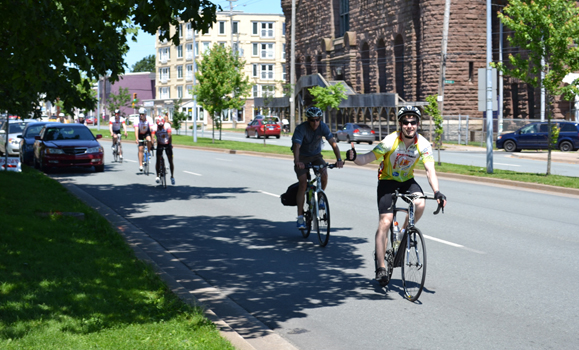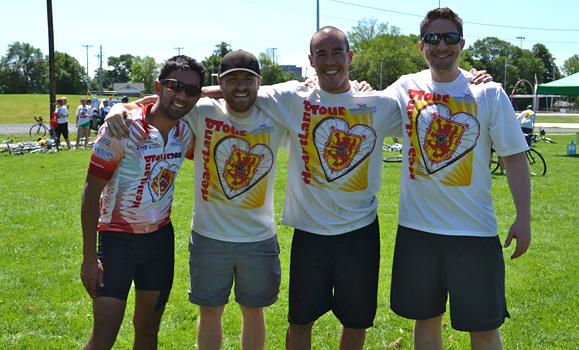Since 2007, a cycling team lead by HÂþ» medical professor Dr. Nick Giacomantonio have hit the road every summer to get community members out on their bikes and thinking about heart health. Among these dedicated cyclists are some of Dalâs brightest medical students racking up the kilometres while connecting with Nova Scotians at all ends of the province.
Training everyday heroes
Jake Blacklaws has been with for three years now and had a major role in implementing the tourâs newest offering â the Heroes Program. A second-year masterâs student in the Department of Medical Neuroscience, Blacklaws not only helped plan the new program but also spent time out in the communities, interacting with the participating families.
The program is designed to help families meet their goals of leading healthier lifestyles, and Blacklawsâ job was to work with families â in person, over the phone and online â to set attainable goals for increasing physical activity in their daily routines. Participants filled out goal-making forms and, over the year-long program, contacted Heartland members like Blacklaws with any questions.
âThe benefit of the goal-making forms, and discussions ⦠was taking the focus off âthe number on the scaleâ and putting it onto changes in their lives,â says Blacklaws.
Families were able to celebrate their progress by participating in this yearâs Heartland Tour, which took place July 7-13 with the cycling team visiting communities across the province. Blacklaws explains that, in each community, there was a ride designed around the goals of the Heroes Program family.

Heartland riders hit the streets of Halifax.
âWhether it was the younger kids leading the ride through the community, or one of the other family members completing a 20-km ride for the first time, the families were a focal point of that portion of the tour.â
Encouraging healthy living
Third-year medical student and first-time Heartland cyclist Luke Richardson provided photo, video and social media coverage for the Heroes program. He was able to meet each participating family while traveling the province during the tour.
âThis was by far the most rewarding and enjoyable part of the tour,â says Richardson. âThe families and individuals who attended were incredibly inspirational and I hope the program can continue to develop to include more participants, leaders, families and regions.â
Richardson, who already holds a masterâs degree in public health, believes the Heartland Tour and Heroes Program are attractive opportunities for medical students who want to be more involved in public health.
âOur future health care success will largely depend on the development of our population health and health promotion strategies including leading strategies such as the Heartland Tour.â

Dal medical students and Heartland Tour participants (left to right) Aniket Hooda, James Gould, Brett Barro and Jake Blacklaws.
Brett Barro, who will be entering his second year of medical school at Dal in the fall, enjoyed his first year with Heartland helping drive the support van and promote the tour. He also had the chance to meet the Heroes Program families in person while on the tour and hopes to continue with the program in the coming year.
With an interest in population health and the impacts of exercise and diet, Barro is happy to see a program with a great message spread the word so well.
âThe Heartland Tour experience has shown me that we can make a profound change in the health of our communities through innovative and fun programs that have the potential to reach the masses.â
Presenting relatable results
For Aniket Hooda, a third-year medical student and three-time Heartland participant, the Heartland Tour has supplemented his education in award-winning ways. Last year, Hooda set up a testing station for every leg of the tour, testing interested community members for risk factors of atrial fibrillation â a heart condition common in Nova Scotia that often leads to strokes.
Hooda ran EKGs, measured blood sugar levels, and noted the height and weight of all those tested in order to calculate their atrial fibrillation (AF) risk scores. He didnât stop his research with last yearâs tour, returning to all the communities that were visited on the cycling trip and collected the same risk factor data from the general population (not just those who attended the cycling tour) at local pharmacies and grocery stores.
Hooda presented his AF research at the Canadian National Medical Student Research Symposium in Winnipeg earlier this year, taking home the award for Experienced Researcher Poster Presentation. He explains that, among the numerous presenters from across the country, his AF study was the only community-based research project.
âOurs was the only one that was not basic science,â says Hooda. âWe went out in the field and looked at people as opposed to rats or guinea pigs in the lab.â
He believes that the Heroes Program helps to make active living a family affair, encouraging healthy lifestyles from generation to generation.
âThatâs why you see kids here, because thatâs where it all starts.â
Hooda would like to continue offering AF risk factor tests in Nova Scotian communities and hopes that the next classes of Dal medical students will pick up where he leaves off. Not only do the testing stations provide residents with an awareness of the common heart condition and advice on how to reduce their risk of developing it, but all test participants also received a copy of their EKG results.
âIf they have heart troubles in the future itâs good to have a healthy EKG to compare,â says Hooda.
Hooda is currently preparing to present a full paper on his AF study at the Canadian Cardiovascular Congress, to which he has had an abstract accepted.
Learn more about the Heartland Tour at its website:

